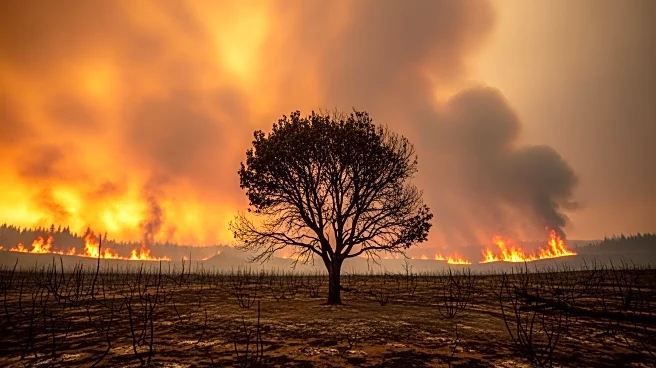What's Happening?
A recent report highlights the increasing intensity of wildfires worldwide, attributing this trend to human-driven climate change. The 'State of Wildfires 2024-25' report reveals that global warming has significantly heightened the scale and severity
of wildfires, making severe fire seasons 25 to 35 times more likely. The study utilized satellite data, weather reanalysis, and land-surface models to demonstrate how heat, drought, and vegetation changes have led to record-breaking fires in regions such as the Amazon and California. The report indicates that from March 2024 to February 2025, wildfires burned an area larger than India, with significant carbon dioxide emissions recorded in Bolivia, Canada, and Brazil's Pantanal region. These emissions contribute to a feedback loop that exacerbates global warming, further intensifying wildfires.
Why It's Important?
The intensification of wildfires due to climate change has profound implications for human and ecological systems. The 2024-2025 wildfires resulted in over 200 fatalities globally, with significant economic damages in regions like Southern California and Canada's Jasper National Park. The fires also severely impacted air quality, with particulate pollution in Brazil reaching levels 60 times higher than WHO's safe limits. This situation exposes millions to toxic smoke, posing health risks. The findings underscore the urgent need for effective climate policies and fire management strategies to mitigate these impacts. The report's reliance on satellite data highlights the critical role of space-based observations in understanding and addressing climate-related challenges.
What's Next?
Future iterations of the 'State of Wildfires' report will increasingly depend on advanced Earth observation technologies to monitor fire conditions in real-time. Researchers aim to explore how local fire management decisions can influence wildfire outcomes, identifying effective strategies and lessons learned. This ongoing research will inform policymakers on climate finance and nature-based solutions to address the growing wildfire threat. As scientific methods advance, there is potential for more comprehensive analyses of fire management practices, contributing to more resilient and adaptive responses to climate-induced wildfires.
Beyond the Headlines
The report highlights the complex interplay between climate, vegetation, and human activities in shaping wildfire dynamics. It emphasizes the need for integrated approaches that consider these factors in fire management and climate adaptation strategies. The findings also raise ethical considerations regarding the responsibility of industrialized nations in addressing climate change impacts, particularly in vulnerable regions. As the climate signal becomes more pronounced in extreme fire events, there is a growing imperative for global cooperation and commitment to reducing greenhouse gas emissions and enhancing resilience to climate change.

















